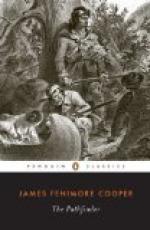The half-hour that succeeded was awfully solemn and still. The moccasin of Pathfinder was barely heard overhead, and occasionally the sound of the breech of a rifle fell upon the floor, for he was busied in examining the pieces, with a view to ascertain the state of their charges and their primings. Beyond this, nothing was so loud as the breathing of the wounded man. Mabel’s heart yearned to be in communication with the father she was so soon to lose, and yet she would not disturb his apparent repose. But Dunham slept not; he was in that state when the world suddenly loses its attractions, its illusions, and its power; and the unknown future fills the mind with its conjectures, its revelations, and its immensity. He had been a moral man for one of his mode of life, but he had thought little of this all-important moment. Had the din of battle been ringing in his ears, his martial ardor might have endured to the end; but there, in the silence of that nearly untenanted blockhouse, with no sound to enliven him, no appeal to keep alive factitious sentiment, no hope of victory to impel, things began to appear in their true colors, and this state of being to be estimated at its just value. He would have given treasures for religious consolation, and yet he knew not where to turn to seek it. He thought of Pathfinder, but he distrusted his knowledge. He thought of Mabel, but for the parent to appeal to the child for such succor appeared like reversing the order of nature. Then it was that he felt the full responsibility of the parental character, and had some clear glimpse of the manner in which he himself had discharged the trust towards an orphan child. While thoughts like these were rising in his mind, Mabel, who watched the slightest change in his breathing, heard a guarded knock at the door. Supposing it might be Chingachgook, she rose, undid two of the bars, and held the third in her hand, as she asked who was there. The answer was in her uncle’s voice, and he implored her to give him instant admission. Without an instant of hesitation, she turned the bar, and Cap entered. He had barely passed the opening, when Mabel closed the door again, and secured it as before, for practice had rendered her expert in this portion of her duties.
The sturdy seaman, when he had made sure of the state of his brother-in-law, and that Mabel, as well as himself, was safe, was softened nearly to tears. His own appearance he explained by saying that he had been carelessly guarded, under the impression that he and the Quartermaster were sleeping under the fumes of liquor with which they had been plied with a view to keep them quiet in the expected engagement. Muir had been left asleep, or seeming to sleep; but Cap had run into the bushes on the alarm of the attack, and having found Pathfinder’s canoe, had only succeeded, at that moment, in getting to the blockhouse, whither he had come with the kind intent of escaping with his niece by water. It is scarcely necessary to say that he changed his plan when he ascertained the state of the Sergeant, and the apparent security of his present quarters.




